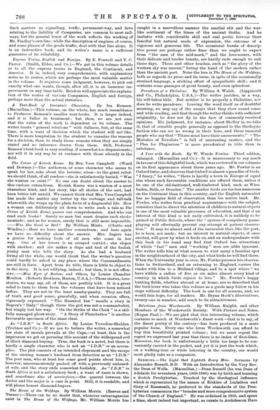The Crime of Keziah Keene. By Mrs. Vere Campbell. (Ward
and Downey.)—The authoress, or some character who seems to speak for her, asks about the heroine, when—to the great relief, we should think, of all readers—she is satisfactorily buried, " Was she wanton or saint ?" No one can doubt about the answer to this curious conundrum. Keziah Keene was a wanton of a most shameless kind, and her story, like all stories of the sort, had been better left untold. We cannot think that Mrs. Vere Campbell has made the matter any better by the verbiage and tall-talk wherewith she wraps up the plain facts of a disgraceful life. How a woman can deliberately sit down to write such a tale as The Crime of Keziah Keene, passes our comprehension. And who can read such books ? Surely no man but must despise such rhodo- montade ; and as for women, surely that is still more impossible. —Was She Good or Bad? By William Mint*. (Chatto and Windus.)—Here we have another conundrum ; and here again we have no difficulty about the answer. Mrs. Ingers has a genius for making fools of all men who come in her way. One of her lovers is an escaped convict ; she elopes with another; and she makes a dupe and tool of the foolish young man who tells the story. As she had a husband living all the while, one would think that the writer's question could hardly be asked in any place where the Commandments are still in force. Apart from its title, there is little to object to in the story. It is not edifying, indeed ; but then, it is not offen- sive.—Miss Eyre of Boston, and Others, by Louise Chandler Moulton. (Roberts Brothers, Boston, U.S.A.)—These stories, love- stories, we may say, all of them, are prettily told. It is a great relief to turn to them from the volumes that have been noticed before. They are not in the least namby-pamby. They are full
of truth and good sense, gracefully, and when occasion offers, vigorously expressed. "The Haunted Inn" recalls a story in Rogers's "Italy," though there the girl was not a somnambulist, but simply lost her way. " On the Strike of the Clock " is a skil- fully managed ghost-story. " A Story of Planchettes " is another favourable specimen of the same class.






















































 Previous page
Previous page